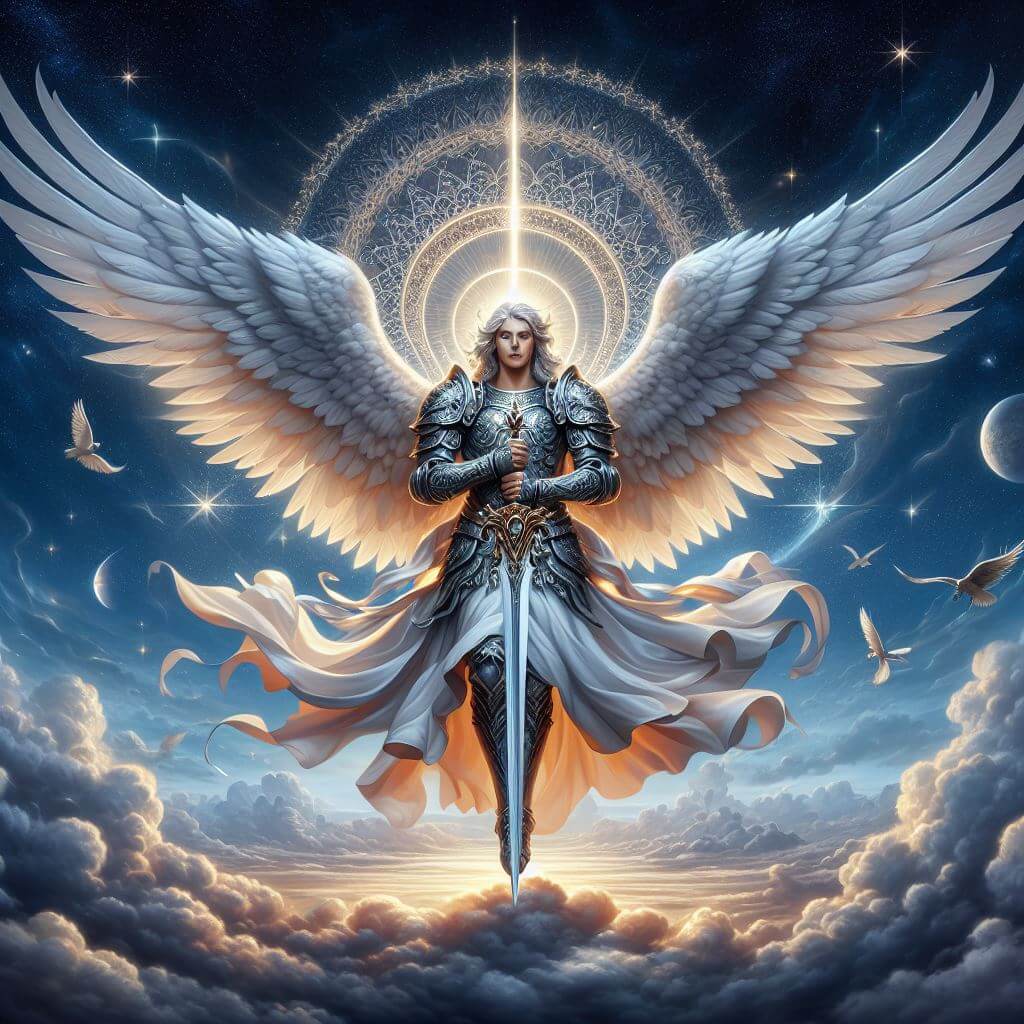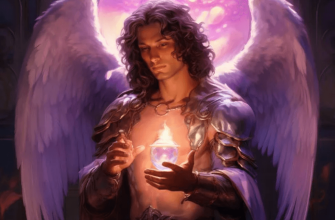Archangel Azrael is known as the Angel of Death in Islam, Judaism, and some sects of Christianity. His name means “Whom God helps” in Hebrew. Azrael’s primary role is to gently guide the souls of the deceased from the earthly realm to the afterlife. He comforts those who are grieving and ensures a peaceful transition for the departing soul. As the Angel of Death, Azrael oversees the separation of the soul from the body at the time of physical death. He is one of the archangels closest to God and serves as an intermediary between heaven and earth.
Some also believe Azrael records the fate of souls and that he will play an important role on Judgement Day. While Azrael represents death, he is not evil or destructive. Rather, he symbolizes the compassionate release from suffering and entry into the next phase of existence. Azrael’s presence brings peace to those nearing death and solace to those left behind.
Azrael in Islam

In Islam, Azrael is one of the four major archangels along with Gabriel, Michael, and Israfil. He is often referred to as the Angel of Death and is responsible for separating souls from their bodies when humans die.
Azrael’s origins come from the Quran, where he is not named specifically but referenced as the angel of death. His duties include descending to Earth to collect souls and transport them to the afterlife. Islamic tradition holds that Azrael descends with a scroll containing the names of those whose time has come. He is often depicted in Islamic art as a large winged figure holding a scroll.
While the Angel of Death is feared by many, in Islam his role is seen as a necessary part of the cycle of life and death. Azrael treats all souls equally and is not evil, but simply carrying out God’s will. His detachment and lack of emotion allows him to perform his sacred duty without prejudice or corruption.
Azrael in Judaism
Azrael is not mentioned by name in traditional Jewish texts like the Tanach or Talmud. However, some mystical Jewish traditions refer to an Angel of Death figure. In Kabbalah, there are references to an angel called Samael who is associated with death and said to be one of the angels God uses to carry out judgments.
Overall, Azrael does not play a major role in mainstream Judaism. The Jewish tradition focuses more on life than death, so there is not much elaboration on a specific Angel of Death. Jewish thought emphasizes God’s role in determining life and death, not a particular angel.
Azrael in Christianity
In Christian tradition, Azrael is sometimes considered the Angel of Death, though he is never directly named in the Bible. The Angel of Death is referenced in passages like Exodus 12, where he takes the lives of firstborn sons in Egypt.
Some scholars believe Azrael may be the “destroying angel” mentioned in Revelation 9:11 whose name is Abaddon in Hebrew or Apollyon in Greek. This angel is described as being given power over a plague of locusts that torments people.
While not directly equated with Azrael, the Angel of Death is occasionally referenced in the Bible and is generally accepted as the being who separates souls from their bodies at death. However, the name “Azrael” is never used. The role of guiding souls after death is more often associated with angels like Michael, Gabriel, and Raphael.
Overall, Azrael has a minor and ambiguous presence in the Bible and Christian tradition. His origins are more prominent in Jewish and Islamic lore. But he is sometimes considered a personification of death that overlaps with biblical references to destroying angels and separation of the soul.
Azrael’s Physical Description
Azrael is often depicted as a winged man wearing a creamy white robe. He is described as having a benevolent and soothing presence. Some associate Azrael with a beam of creamy white light that brings comfort to souls as he guides them to the afterlife.
As the Angel of Death, Azrael is imbued with wisdom about the cycle of life and death. His energy is gentle and loving despite his somber role. Azrael’s wings represent flight and transition between realms. The creamy white color of his robe symbolizes purity, light, and new beginnings as souls leave the earthly plane behind. Though Azrael may appear fearsome, his essence contains deep compassion.
Azrael’s Interactions with Humans

Archangel Azrael is known as the angel of death in Islam, Judaism, and some sects of Christianity. He is believed to guide the souls of the deceased into the afterlife. There are a few recorded legendary accounts of Azrael directly interacting with people:
According to Islamic tradition, Azrael accompanies each person through life. When the time comes for someone’s death, Azrael gently takes their soul and guides it to the afterlife. There is a hadith that describes the Prophet Muhammad seeing Azrael in his true enormous size with 600 wings filling the horizon. Azrael is said to have greeted and reassured the Prophet during this visionary experience.
In the Jewish mystical tradition, there is a story of Azrael guiding the soul of Moses after his death. According to legend, the archangel Michael disputed with the devil over Moses’ body. Azrael was then sent to properly retrieve Moses’ soul and escort it to heaven.
Some Christian sects also believe Azrael helps escort saved souls to heaven. He is sometimes shown with a scroll containing the names of the righteous he will welcome to paradise. While not all Christian denominations accept the Book of Enoch and its descriptions of angels, some believe it represents an authentic tradition of Azrael’s role.
Overall, Azrael is most prominently known as the angel who compassionately guides souls after death. The angel’s interactions with people seem limited to comforting and escorting them in their transition to the afterlife in Abrahamic religious lore.
Invoking Azrael
Invoking Azrael, the Angel of Death, can provide comfort and guidance when grieving the loss of a loved one.
There are several recommended methods for calling upon Azrael:
-
Devout prayer and petition is one of the most direct ways to invoke Azrael’s presence and request his assistance. Speaking from the heart and asking for Azrael’s comfort, wisdom or intervention can open a channel for communication.
-
Visualization and meditation techniques allow you to mentally make contact with Azrael. Picture him in your mind’s eye, imagine his energy filling the space around you, and focus your intention on requesting his help.
-
Creating a sacred space or altar can help attract Azrael’s presence. Including symbols, colors, or objects associated with Azrael sends an invitation for him to visit.
Calling on Archangel Azrael with focus, faith and sincerity can open the channels to receive his blessings and aid during difficult times of loss and transition. His divine guidance brings reassurance that loved ones have safely crossed over.
Azrael in Pop Culture
Azrael has made appearances in various works of modern pop culture. He is referenced in books, TV shows, movies, comics and more.
In the comic book series The Sandman by Neil Gaiman, Azrael appears as one of the Endless, a group of powerful anthropomorphic personifications of metaphysical concepts. He represents death and guides souls into the afterlife.
On the TV show Lucifer, Azrael is depicted as the angel of death and Lucifer’s sister. She is portrayed as having a quirky, bubbly personality in contrast to the more serious role typically ascribed to the Angel of Death.
In the anime and light novel series Highschool DxD, Azazel is depicted as a fallen angel and acts as a teacher and advisor at the high school attended by the main characters. This is a very different portrayal from traditional Abrahamic theology.
The video game Darksiders II features Azrael as an angel who aids the horseman Death by giving him advice and direction to help resurrect humanity. This interpretation draws from Islamic tradition of Azrael being the angel of death.
These are just a few examples of Azrael’s appearances in modern pop culture, where he is reimagined and adapted from his traditional roots for the purpose of storytelling and entertainment. Despite departures from tradition, these works showcase Azrael’s enduring legacy.
Azrael Symbolism

Azrael is often associated with death, grief, and loss in various religious traditions. His name translates to “Angel of God” or “Help from God” in Hebrew, reflecting his divine role in facilitating the transition between life and death.
In Islam, Azrael is believed to separate souls from their earthly bodies when they die by touching them with his hand or wing. This has imbued him with symbolic meaning related to the separations and transitions experienced in death. His presence is thought to provide comfort and reassurance to the dying.
Some mystical traditions depict Azrael in a dark cloak and hood, wielding a scythe or sword. This grim reaper-like imagery symbolizes his role in severing earthly attachments at the time of death. The scythe represents cutting through illusions, while the sword signifies dispelling fears around dying.
Overall, Azrael’s symbolic associations emphasize his divine purpose in facilitating difficult but sacred transitions. Although culturally feared, he ultimately represents the promise of moving onward into new states of being after earthly life. His presence is meant to reassure that death is part of a greater divine process.
Conclusion
In summary, Archangel Azrael is known as the Angel of Death in Islam, Judaism, and Christianity. He is tasked by God to separate souls from their physical bodies at the time of death and guide them to the afterlife. Though his duty may seem morbid, Azrael is not evil, but rather benevolent. He comforts souls as they transition between realms and helps them accept their fate. Physically, Azrael is described as having four faces and four thousand wings, reflecting his omnipresence and closeness to the Divine.
Though feared, Azrael can be invoked by those nearing death for protection and mercy. He occasionally appears in pop culture, such as on the TV show Supernatural. Overall, Azrael symbolizes the inevitability of death, the omnipotence of God, and the hope for salvation in the afterlife. Despite his sobering role, Azrael ultimately aims to bring peace and understanding to departing souls.








